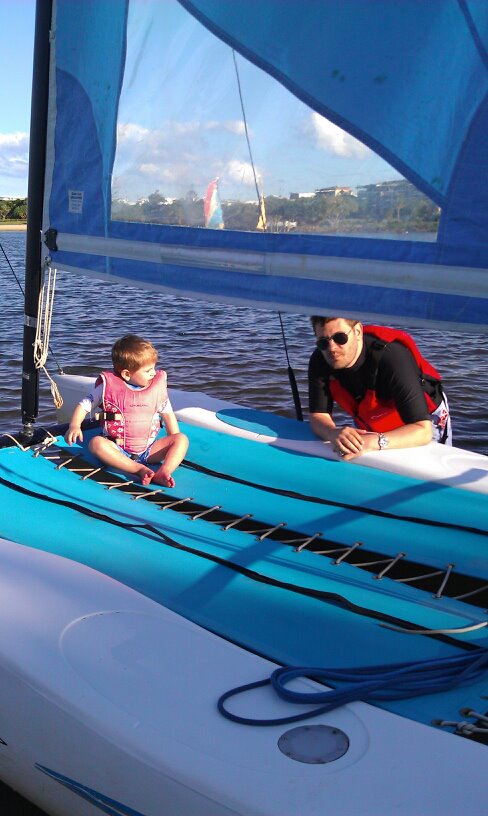Taking to the water with young kids can be a little anxiety provoking for parents. While we haven’t been able to stretch our budget far enough to purchase our own boat (which we would love to do) we have taken other opportunities to enjoy being on the water with our kids. This has included hiring water-craft, staying in resorts which include use of catamarans and other small vessels, and many trips to the Great Barrier Reef. As well as concerns regarding water safety (which we take very seriously) parents may be worried about the possibility of their child experiencing sea-sickness, particularly if they have experienced it themselves.
The brain receives information from both our eyes and ears to detect motion. When there is a clash between the information it receives from these two organs motion sickness may result, of which sea-sickness is a variety.
An industry of preventive and treatment agents for sea-sickness has arisen. Unfortunately the evidence base to support the marketing of most sea-sickness preventive agents for children (including popular ones such as acupuncture) is slim. The safety of proven preventives for adults is rarely tested in children. Parents can however do the following to prevent their child becoming sea-sick on water voyages:
Positioning in the boat.
Sitting in the central cabin of a ship should reduce the extent of motion experienced. If you know your child is a sufferer you may want to request seating or cabin positioning accordingly.
Avoid unnecessary head movement
This can be done by encouraging your child to use a pillow or headrest. • Ginger products A number of studies have indicated that ginger may relieve the symptoms of motion sickness. Packing some ginger snaps for your water voyage may help avoid nasty vomits.
Avoid overheating by opening windows.
Prevent your child from reading, doing puzzles or drawing while on the boat.
Timing of the voyage
The likelihood of children experiencing sea-sickness increases after the age of two. If planning a trip involving significant cruising, and you are worried about sea-sickness you may want to factor this into the timing of the trip. For example, if you have flexibility you may schedule a cruise when you little one is eighteen months instead of twenty six months old. Recline your little one as far back as is possible.
Medication
Medication is not recommended for children under two years of age to treat sea-sickness. Two medication types, anti-histamines and anti-cholinergics are the mainstay of medical management for over twos. The anti-histamines promethazine theoclate, promethazine hydrochloride and dimenhydrinate are approved for use in Australia. They should be given at least 30 minutes before departing. Although usually sedative, children may become over-active on these medications. A trial at home before travelling is wise. Hyoscine hydrobromide is about as effective as the anti-histamines but less sedating. Always discuss your plans to use any of these medications with your doctor.
What to do if your child is experiencing sea sickness
Reduce your child’s sensory input. Do this by laying your child down, getting them to close their eyes or to wear an eye mask.
Distraction Sucking a lolly or a smelling a mint fragranced handkerchief might temporarily stave off symptoms. Don’t distract using activities such as reading, or coloring in as they may worsen symptoms.
Medication Promethazine theoclate, promethazine hydrochloride, dimenhydrinate and hyoscine bromide may be used for continuing management of motions sickness usually six hours after the initial dose (but check the instructions on the packet).
© Copyright 2014 Danielle, All rights Reserved. Written For: Bubs on the Move




I’m going to try all this advice for myself. I get horrible sea sickness — so much that I was too nervous to go all the way to the Outer Reef. I love ginger chews even if I’m not on the water. When my daughter starts getting motion sickness, we let her put accupressure bands on her inside wrists. I have no idea if they work, but she at least feels like she’s addressing the problem somewhat.
Michele if sea-sickness is a real problem next time you are near the GBR consider doing one of the reef island trips instead of the outer reef trip. Alternatively there are half day jetboat trips to the Outer Isles from Port Douglas – great snorkeling and if you are struggling at least you are not stuck out there all day.
Any truth to the old “look at the horizon” adage? I heard it helps the body “make sense of” the differing inputs.
It helps a little bit but young kids won’t keep doing it. Best bang for your buck is to invest in some of the medications if it is bad.